Unit 5 Do you have a soccer ball 知识讲解与练习
七年级英语上册 Unit 5 Do you have a soccer ball(单词+重点句型)语法解析
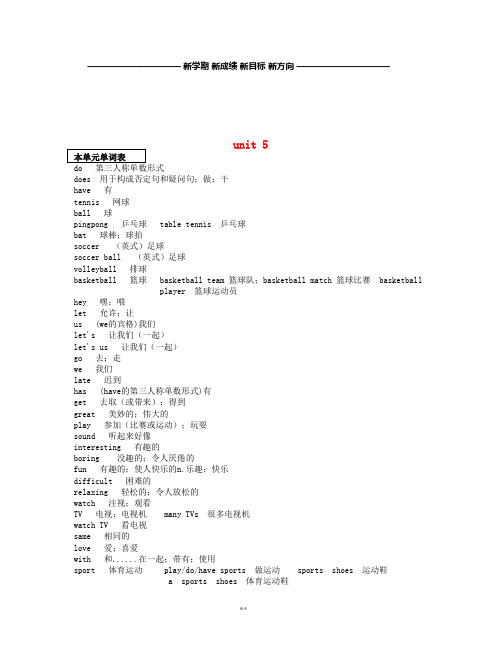
——————————新学期新成绩新目标新方向——————————unit 5does 用于构成否定句和疑问句;做;干have 有tennis 网球ball 球pingpong 乒乓球 table tennis 乒乓球bat 球棒;球拍soccer (英式)足球soccer ball (英式)足球volleyball 排球basketball 篮球 basketball team 篮球队;basketball match 篮球比赛 basketball player 篮球运动员hey 嘿;喂let 允许;让us (we的宾格)我们let's 让我们(一起)let's us 让我们(一起)go 去;走we 我们late 迟到has (have的第三人称单数形式)有get 去取(或带来);得到great 美妙的;伟大的play 参加(比赛或运动);玩耍sound 听起来好像interesting 有趣的boring 没趣的;令人厌倦的fun 有趣的;使人快乐的n.乐趣;快乐difficult 困难的relaxing 轻松的;令人放松的watch 注视;观看TV 电视;电视机 many TVs 很多电视机watch TV 看电视same 相同的love 爱;喜爱with 和......在一起;带有;使用sport 体育运动 play/do/have sports 做运动 sports shoes 运动鞋a sports shoes 体育运动鞋them (they的宾格)他(她、它)们only 只;仅like 喜欢;喜爱easy 容易的;不费力的after 在......以后class 班级;课(近义词:lessen);等级;类别;阶段classmate 同班同学 roommate 室友 workmate 同事 deskmate 同桌schoolmate 校友Bill 比尔(男名)on的用法,详见unit4【解析】on可以表示“通过;使用……方式”,后面通常接表示通信工具的名词。
Unit 5 Do you have a soccer ball 知识点归纳-七年级上册英语

人教版新目标七上英语单元知识点归纳Unit 5 Do you have a soccer ball?重点词汇tennis/'tenis/ n. 网球bat /bæt/ n. 球棒;球拍soccer ball (英式)足球volleyball/'vɔlibɔ:l/ n. 排球basketball/'ba:skitbɔ:l/ n. 篮球late/leit/ adj. 迟到great/greit/ adj. 美妙的;伟大的play/plei/ v. 参加(比赛或运动);玩耍sound/saund/ v. 听起来好像interesting/'intrəstiŋ/ adj. 有趣的boring/'bɔ:riŋ/ adj. 没趣的;令人厌倦的fun/fʌn/ adj. 有趣的;使人快乐的n.乐趣;快乐difficult/'difikəlt/ adj. 困难的relaxing/ri'læksiŋ/ adj. 轻松的;令人放松的watch/wɔtʃ/ v. 注视;观看same/seim/ adj. 相同的easy/'i:zi/ adj. 容易的;不费力的class/kla:s/ n. 班级;课classmate/'kla:smeit/ n. 同班同学重点短语:a tennis bat 一个网球拍play basketball 打篮球baseball bat 棒球棒have a soccer ball 有一个足球play soccer 踢足球with our friends 和我们的朋友一起have a ping-pong ball 有一个乒乓球play ping-pong 打乒乓球have a volleyball 有一个排球play volleyball 打排球at school 在校,上学play sports 做运动watch TV 看电视in my bag 在我的包里be late 迟到on TV 电视上必背典句:1. Do you have a soccer ball? 你有一个足球吗?2. Does he/she have a ping-pong ball?他/她有一个乒乓球吗?3. Do you play sports with your classmates? 你和你的同学一起做运动吗?4. Let’s play soccer together! 我们一起踢足球吧!5. How many sports do you like?你喜欢多少种运动?6. I like playing soccer and basketball. 我喜欢踢足球和打篮球。
人教版七年级上Unit5 Do you have a soccer ball知识点归纳
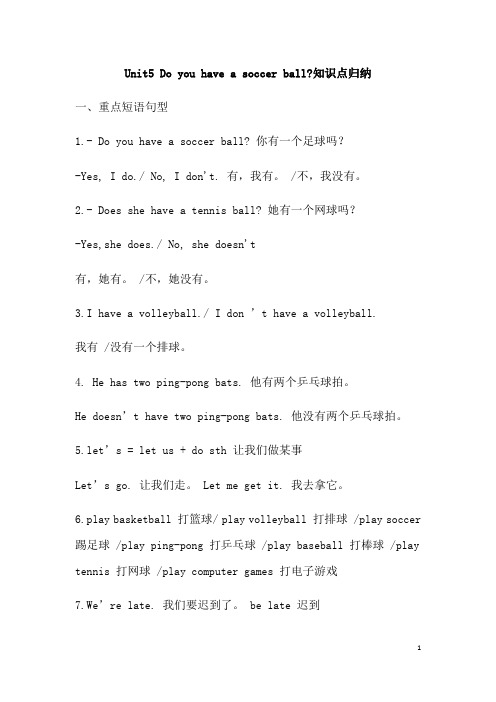
Unit5 Do you have a soccer ball?知识点归纳一、重点短语句型1.- Do you have a soccer ball? 你有一个足球吗?-Yes, I do./ No, I don't. 有,我有。
/不,我没有。
2.- Does she have a tennis ball? 她有一个网球吗?-Yes,she does./ No, she doesn't有,她有。
/不,她没有。
3.I have a volleyball./ I don ’t have a volleyball.我有 /没有一个排球。
4. He has two ping-pong bats. 他有两个乒乓球拍。
He doesn’t have two ping-pong bats. 他没有两个乒乓球拍。
5.let’s = let us + do sth 让我们做某事Let’s go. 让我们走。
Let me get it. 我去拿它。
6.play basketball 打篮球/ play volleyball 打排球 /play soccer 踢足球 /play ping-pong 打乒乓球 /play baseball 打棒球 /play tennis 打网球 /play computer games 打电子游戏7.We’re late. 我们要迟到了。
be late 迟到8.That sounds good. 那听起来很不错。
That sounds interesting/fun/relaxing/boring/difficult. 那听起来很有趣 /放松 /无聊 /困难。
9.watch TV 看电视10.play sports with our classmates 和我的同学做运动11.go to the same school 去同一间学校上学。
12.at school 在学校13.only watch them on TV 只在电视上看它们14.It ’s adj(形容词) for sb.对某人来时怎么样。
七上英语Unit 5 Do you have a soccer ball知识归纳

Unit 5 Do you have a soccer ball?△词汇:1.球类名词小结soccer ball英式足球ping-pong ball乒乓球tennis网球volleyball 排球basketball篮球2.“球拍”的表达tennis racket网球拍ping-pong bat乒乓球拍3.play + 名词结构的短语play sports参加体育运动play computer games玩电脑游戏4.“play + 球类名词”结构的短语play ping-pong ball打乒乓球play tennis 打网球play soccer踢足球play volleyball打排球5. sports club 体育俱乐部Sport“运动”,修饰名词时,总是用复数形式。
sports meeting运动会sports shoes运动鞋6.play/do sports做运动7.watch TV看电视on TV在电视上,通过电视8.on TV/on the radio/on the computer/on the phone在电视上/在收音机上/在电脑上/在电话上电子产品上用介词on。
9.常用的描述某物或某事的形容词:interesting有趣的fun有趣的relaxing轻松的boring无聊的difficult困难的10.have a great sports collection有大量的体育收藏品11.every day 每天She plays sports every day. 她每天都做运动。
everyday日常的everyday English 日常英语12.after class 下课后after school 放学后13. It’s easy for me.这对我来说挺容易的。
14. We’re late! 我们迟到了!be late for…. ……迟到Don’t be late for school.不要上学迟到。
七年级英语上册Unit5 Do you have a soccer ball知识点全面讲解与练习
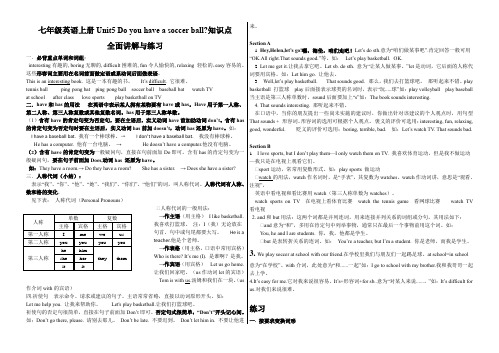
七年级英语上册Unit5 Do you have a soccer ball?知识点全面讲解与练习一.必背重点单词和词组:interesting有趣的, boring无聊的, difficult困难的, fun令人愉快的, relaxing轻松的,easy容易的。
这些形容词主要用在名词前面做定语或系动词后面做表语。
This is an interesting book. 这是一本有趣的书。
It’s difficult. 它很难。
tennis ball ping-pong bat ping-pong ball soccer ball baseball bat watch TVat school after class love sports play basketball on TV二.have和has的用法在英语中表示某人拥有某物要有have或has。
Have用于第一人称、第二人称、第三人称复数或其他复数名词。
has用于第三人称单数。
(1)含有have的肯定句变为否定句,要在主语后,实义动词have前加助动词don’t。
含有has 的肯定句变为否定句时要在主语后,实义动词has前加doesn’t,动词has还原为have。
如:I have a baseball bat. 我有一个棒球棒。
→I don’t have a baseball bat.我没有棒球棒。
He has a computer. 他有一台电脑。
→ He doesn’t have a computer.他没有电脑。
(2)含有have的肯定句变为一般疑问句,直接在句前面加Do即可。
含有has的肯定句变为一般疑问句,要在句子前面加Does,动词has 还原为have。
如:They have a room.→ Do they have a room? She has a sister. → Does she have a sister?三.人称代词(小结):表示“我”、“你”、“他”、“她”、“我们”、“你们”、“他们”的词,叫人称代词。
Unit-5---Do-you-have-a-soccer-ball(1)知识点

Unit 5 Do you have a soccer ball ?一、重点单词、词组1、play “玩,耍” ,在句中要灵活翻译。
ping—pong 打乒乓球tennis 打网球soccor 踢英式足球球类名词前面不用play volleyball 打排球冠词the a anbasketball 打篮球sports 参加体育运动2、Let’s = Let us . “让我们” 。
Let’s + V原。
常用来提出一个建议,表示“让我们干……吧” 。
(1)、Let’s play tennis .让我们打网球吧。
(2)、Let’s play computer games . 让我们玩电脑游戏吧。
(3)、Let’s watch TV . 让我们看电视吧。
3、That sounds good . “这个听起来好。
” 该句型常用来肯定对方== interesting 提出的建议。
== fun4、It’s boring / relaxing . 它是无聊的/ 轻松地。
5、sports “ 运动” ,修书名时,它常用复数形式。
sport s club 运动俱乐部sport s collection 运动收藏品本块习题:1、补全对话A:Let’s ______TV . B:That sounds ______ . I don’t like watching TV .A:______ you have a ping—pong hat ? B:Yes , I doA:Let’s______ ping—pong . B:That sounds ______. Let’s go .2、改错(1)、Let’s play the basketball . (2)、Let’s play a volleyball .A B C A B C(3)、Let’s watches TV . (4)、That sound interesting .A B A B(5)、I have a great sport collection . (6)、He has many sports club .A B C A B C二、重点句型:Let's play soccer.That sounds good.Do you have a soccer ball?No, I don't.I have two tennis rackets.let's play tennis.I think he has a ping-pong ball.That sounds interesting.Let's play soccer.I don’t have a soccer ball.We play it at school with our friends.It’s relaxing.I love sports,but I don’t play them,I only watch them on TV.After class, I play ping-pong with my classmate.I don’t have a baseball,but I have a soccer ball.三、一般现在时:(1、现在的状态。
知识讲解和语法一点通Unit 5
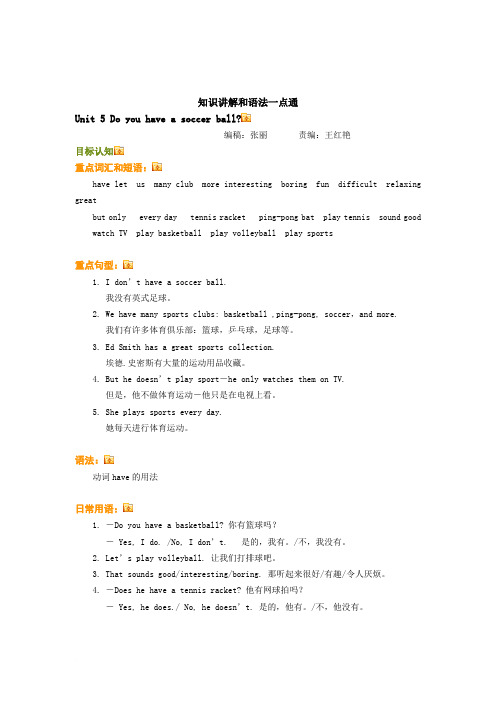
知识讲解和语法一点通Unit 5 Do you have a soccer ball?编稿:张丽责编:王红艳目标认知重点词汇和短语:have let us many club more interesting boring fun difficult relaxing greatbut only every day tennis racket ping-pong bat play tennis sound good watch TV play basketball play volleyball play sports重点句型:1. I don’t have a soccer ball.我没有英式足球。
2. We have many sports clubs: basketball ,ping-pong, soccer,and more.我们有许多体育俱乐部:篮球,乒乓球,足球等。
3. Ed Smith has a great sports collection.埃德.史密斯有大量的运动用品收藏。
4. But he doesn’t play sport-he only watches them on TV.但是,他不做体育运动-他只是在电视上看。
5. She plays sports every day.她每天进行体育运动。
语法:动词have的用法日常用语:1. -Do you have a basketball? 你有篮球吗?- Yes, I do. /No, I don’t. 是的,我有。
/不,我没有。
2. Let’s play volleyball. 让我们打排球吧。
3. That sounds good/interesting/boring. 那听起来很好/有趣/令人厌烦。
4. -Does he have a tennis racket? 他有网球拍吗?- Yes, he does./ No, he doesn’t. 是的,他有。
Unit 5 Do you have a soccer ball?-【豆丁教育百科】

Unit 5 Do you have a soccer ball?单元整体说明单元教材分析本单元主要学习动词have的一般现在时的用法;使用do和does引导的一般疑问句的构成以及简单回答。
本单元围绕“和朋友一起欢度时光”这一话题安排了三个任务:一是列举所学的运动项目,从中挑选出各自喜欢的体育项目,并说明原因,目的是巩固并新学一些体育项目的名词。
二是让学生互相询问所爱好的运动,并根据情况发出邀请,学会用have对物品的所属进行提问与回答,掌握用do和does引导的一般疑问句的构成及使用,了解用Let’s提建议的句型。
三是写作,把任务一、二的完成情况写成日记,进一步复习、巩固所学的语言目标。
Do you/they have a TV?Yes,I/they do./No,I/they don’t. Does he/she have a soccer ball?Yes,he/she does./No,he/she doesn’t. Let’s play soccer.I don’t have a soccer ball./That sounds good.单元总体目标学会用have对物品的所属进行提问与回答;学会用let’s…句型提建议;能够谈论自己喜欢哪些球类运动,不喜欢哪些球类运动及原因;能够谈论怎样和自己的朋友度过一段愉快的时光重点词汇:have,ball,tennis, pingpong,volleyball, let, us. play, well, sound, good, sport, we,many, club, more, class, interesting, boring, fun, difficult, has, great, but, only, them, every, day.racket,重点句型:1,Do you have a TV? Yes, I do. /No, I don’t.2,Do they have computer? Yes, they do. / No, they don’t.3,Does he /she have a soccer ball? Yes, he/she does. No, he/she doesn’t.4,Does he have a baseball? Yes, he does. No, he doesn’t.5,Let’s play soccer. I don’t have a soccer ball.Well, Let’s play volleyball. That sounds good.语法重点:1,行为动词have的一般现在时的用法;2,使用do和does引导的一般疑问句的构成和使用。
人教版七年级上册英语讲义 Unit 5 Do you have a soccer ball

Unit5 Do you have a soccer ball?讲义一、【重点单词】do /du:/助动词,帮助构成一般现在时的否定句或疑问句,无意义;实义动词“做,干”have /hæv/有tennis /'tenɪs/网球ball /bɔ:l/球ping-pong乒乓球bat /bæt/球棒;球拍soccer /'sɑ:kər/,/'sɒkə/(英式)足球soccer ball(英式)足球volleyball /'vɒlɪbɔ:l/排球basketball /'bɑ:skɪtbɔ:l/篮球let /let/允许;让us /ʌs/ (we的宾格)我们let's = let us让我们(一起)go /ɡəʊ/去;走we /wi:/我们late /leɪt/迟到has /hæz/有(have的第三人称单数形式)get /ɡet/去取(或带来);得到great /ɡreɪt/美妙的;伟大的play /pleɪ/参加(比赛或运动);玩耍sound /saʊnd/听起来好像interesting /'ɪntrəstɪŋ/有趣的;使人快乐的;乐趣;快乐difficult /'dɪfɪkəlt/困难的relaxing /rɪ'læksɪŋ/轻松的;令人放松的watch /wɒʧ/注视;观看TV /,ti:'vi:/电视same /seɪm/相同的love /lʌv/爱;喜爱with /wɪð/和...在一起;带有;使用sport /spɔ:(r)t/体育运动them /ðem/ /ðəm/他(她、它)们only /'əʊnlɪ/只;仅like /laɪk/喜欢;喜爱easy /'i:zi/容易的;不费力的after /'ɑ:ftə/在...之后class /klɑ:s/班级;课classmate /'klɑ:smeɪt/同班同学二、【重点短语】1. have a volleyball 有一个排球2. play volleyball/tennis 打排球/网球3. have a ping-pong/table tennis 有一个乒乓球4. play ping-pong/table tennis 打乒乓球5. with our friends 和我们的朋友一起6. have a football/soccer ball 有一个足球7. play football/soccer 踢足球8. at school 在校,在上学9. play sports 做运动10. play computer games 玩电脑游戏11. watch TV 看电视12. in the same school 在同一所学校13. after class 下课后14. go to school 去上学三、【重点句型】1. —Do you have a ping-pong bat? 你有一个乒乓球拍吗?—No, I don’t. 不,我没有。
UnitDoyouhaveasoccerball讲解及练习

Unit 5 Do you have a soccer ball?知识点:1.短语归纳:soccer ball 英式足球 a tennis bat 一个网球拍 play basketball 打篮球 baseball bat 棒球棒play sports 参加体育运动或比赛 watch TV 看电视 in my bag 在我的包里 be late 迟到on TV 电视上2.一般现在时态中have的用法have意为“有”,表示所属关系,有人称和数的变化,其主语一般是人,有时也可以是物。
1.have用于复数名词、第一、二人称单复数或第三人称复数代词作主语的句子中;has为have的第三人称单数形式,用于不可数名词、可数名词或第三人称单数代词作主语的句子中。
例:I have a pen. 我有一个钢笔。
3.have / has的一般疑问句:在句首加助He has a pen. 他有一个钢笔。
动词do或does,句尾加问号构成。
除第2.have / has作谓语时的转换三人称单数用does外,其余都用do.(1)否定句式:主语+don’t / doesn’t +have…第三人称前加does后,句中的谓语动I don’t have an eraser. 我没有橡皮。
词has要变成have.He doesn’t have an eraser. 他没有橡皮。
Does he have a cup? 他有一个茶杯吗?(2)一般疑问句式:Do/ Does+主语+have… 4.Let’s=Let us 让我们……吧。
肯定答语:Yes,主语+do / does.否定答语:No, 主语+don’t / doesn’t. 5.That sounds good.主语+系动词+表语—Do you have a ruler?—Yes, I do. 6.play+the+乐器,play+球类运动名词—No, I don’t.(3)当have / has后的名词被some修饰时,在否定句和疑问句中some要变成any.I have some good friend.→I don’t have any good friend.6.It+be+形容词+for sb,若该句式后加动词时要用动词不定式It+be+形容词+for sb +to do sth做某事对某人来说是……的It easy for me to play ping-pong. 打乒乓球对我来说是简单的。
UnitDoyouhaveasoccerball讲解及练习

Unit 5 Do you have a soccer ball?知识点:1.短语归纳:soccer ball 英式足球 a tennis bat 一个网球拍 play basketball 打篮球 baseball bat 棒球棒play sports 参加体育运动或比赛 watch TV 看电视 in my bag 在我的包里 be late 迟到on TV 电视上2.一般现在时态中have的用法have意为“有”,表示所属关系,有人称和数的变化,其主语一般是人,有时也可以是物。
1.have用于复数名词、第一、二人称单复数或第三人称复数代词作主语的句子中;has为have的第三人称单数形式,用于不可数名词、可数名词或第三人称单数代词作主语的句子中。
例:I have a pen. 我有一个钢笔。
3.have / has的一般疑问句:在句首加助He has a pen. 他有一个钢笔。
动词do或does,句尾加问号构成。
除第2.have / has作谓语时的转换三人称单数用does外,其余都用do.(1)否定句式:主语+don’t / doesn’t +have…第三人称前加does后,句中的谓语动I don’t have an eraser. 我没有橡皮。
词has要变成have.He doesn’t have an eraser. 他没有橡皮。
Does he have a cup? 他有一个茶杯吗?(2)一般疑问句式:Do/ Does+主语+have… 4.Let’s=Let us 让我们……吧。
肯定答语:Yes,主语+do / does.否定答语:No, 主语+don’t / doesn’t. 5.That sounds good.主语+系动词+表语—Do you have a ruler?—Yes, I do. 6.play+the+乐器,play+球类运动名词—No, I don’t.(3)当have / has后的名词被some修饰时,在否定句和疑问句中some要变成any.I have some good friend.→I don’t have any good friend.6.It+be+形容词+for sb,若该句式后加动词时要用动词不定式It+be+形容词+for sb +to do sth做某事对某人来说是……的It easy for me to play ping-pong. 打乒乓球对我来说是简单的。
七年级英语unit5doyouhaveasoccerball人教版知识精讲
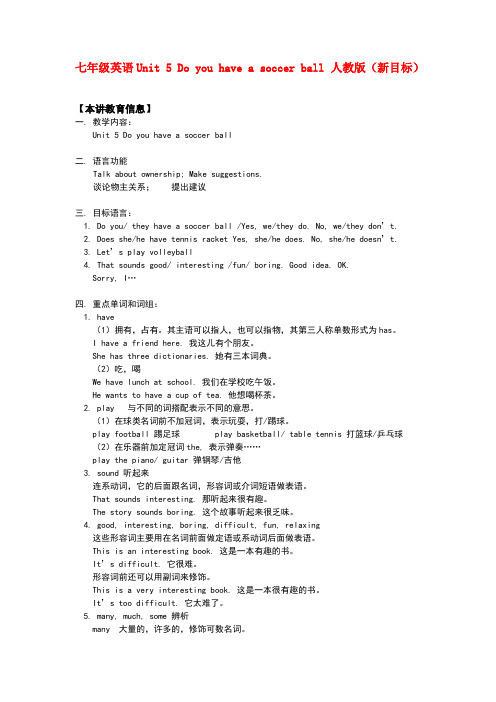
七年级英语Unit 5 Do you have a soccer ball 人教版(新目标)【本讲教育信息】一. 教学内容:Unit 5 Do you have a soccer ball二. 语言功能Talk about ownership; Make suggestions.谈论物主关系;提出建议三. 目标语言:1. Do you/ they have a soccer ball /Yes, we/they do. No, we/they don’t.2. Does she/he have tennis racket Yes, she/he does. No, she/he doesn’t.3. Let’s play volleyball4. That sounds good/ interesting /fun/ boring. Good idea. OK.Sorry, I…四. 重点单词和词组:1. have(1)拥有,占有。
其主语可以指人,也可以指物,其第三人称单数形式为has。
I have a friend here. 我这儿有个朋友。
She has three dictionaries. 她有三本词典。
(2)吃,喝We have lunch at school. 我们在学校吃午饭。
He wants to have a cup of tea. 他想喝杯茶。
2. play 与不同的词搭配表示不同的意思。
(1)在球类名词前不加冠词,表示玩耍,打/踢球。
play football 踢足球play basketball/ table tennis 打篮球/乒乓球(2)在乐器前加定冠词the, 表示弹奏……play the piano/ guitar 弹钢琴/吉他3. sound 听起来连系动词,它的后面跟名词,形容词或介词短语做表语。
That sounds interesting. 那听起来很有趣。
Unit 5 Do you have a soccer ball 重点知识解析
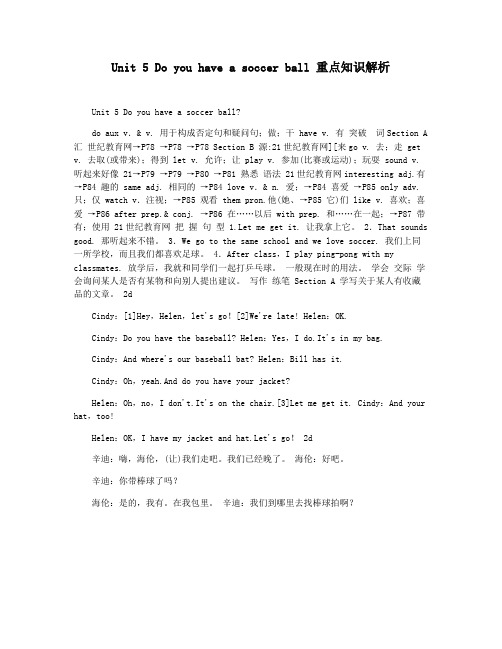
Unit 5 Do you have a soccer ball 重点知识解析Unit 5 Do you have a soccer ball?do aux v.& v. 用于构成否定句和疑问句;做;干 have v. 有突破词Section A 汇世纪教育网→P78 →P78 →P78 Section B 源:21世纪教育网][来go v. 去;走 get v. 去取(或带来);得到 let v. 允许;让 play v. 参加(比赛或运动);玩耍 sound v. 听起来好像21→P79 →P79 →P80 →P81 熟悉语法 21世纪教育网interesting adj.有→P84 趣的 same adj. 相同的→P84 love v.& n. 爱;→P84 喜爱→P85 only adv.只;仅 watch v.注视;→P85 观看 them pron.他(她、→P85 它)们 like v. 喜欢;喜爱→P86 after prep.& conj. →P86 在……以后 with prep. 和……在一起;→P87 带有;使用 21世纪教育网把握句型 1.Let me get it. 让我拿上它。
2.That sounds good. 那听起来不错。
3.We go to the same school and we love soccer. 我们上同一所学校,而且我们都喜欢足球。
4.After class,I play ping-pong with my classmates. 放学后,我就和同学们一起打乒乓球。
一般现在时的用法。
学会交际学会询问某人是否有某物和向别人提出建议。
写作练笔 Section A 学写关于某人有收藏品的文章。
2dCindy:[1]Hey,Helen,let's go![2]We're late! Helen:OK.Cindy:Do you have the baseball? Helen:Yes,I do.It's in my bag.Cindy:And where's our baseball bat? Helen:Bill has it.Cindy:Oh,yeah.And do you have your jacket?Helen:Oh,no,I don't.It's on the chair.[3]Let me get it. Cindy:And your hat,too!Helen:OK,I have my jacket and hat.Let's go! 2d辛迪:嗨,海伦,(让)我们走吧。
(完整word)Unit5Doyouhaveasoccerball知识点,文档

Unit5知识点Ⅰ①助动词: do 和 does.没有实在意义,起帮助作用。
帮助实意动词构成疑问句和否认句。
如 Do you have a soccer ball? She doesn’thave computer.②实意动词:拥有实在意义的动词。
如: have 有;like 喜欢; watch 观看; play 玩,打;sound 听起来; eat 吃;know 知道;think 认为,思虑; want 想要; need 需要。
句中有实意动词时,变否认句和疑问句需要用助动词来帮助。
③顺口溜: I ,we, you,,they 和复数,动词是啥就用啥。
三人称单数权利薄,莫忘动词长尾巴〔 --s;--es〕。
(have 特别变为④三人称单数举例:he ;she ;it ; that ;this; Mary ; Tom; his brother;has) myfriend ;everyone⑤动词原形: do; don ’ t;don’ t have;have; like; watch;动词三单形式:动词原形:play; sound;eat; know; go; think;want ;need;动词三单形式:用所给词的合适形式填空填空。
(have)some color pens and she(have)some color pens ,too .2. They(have)a big room in China.3. Harry(have)two cats.4. Jeff and Jean(have)a son.5. She(have)a big apple.〔watch〕TV every day.(play) soccer every day and my sister(play) soccer every day,too.8.Watching TV(sound)boring.(like) English but Tom(like) math.(know) his telephone number.11.〔do〕 you(have)a bag ?12.Bob ’ s brother(have)a nice watch.13.(do) Bob(have)a tennis?( not have) a pencil.( not have) a Chinese name.( not have) any collections.( not have) a map.18.Li Jun and his father( not have) an alarm clockⅡ顺口溜:变一般疑问句很简单,is 和 are 提前面,大写标点也要变。
Unit5 Do you have a soccer ball-讲义
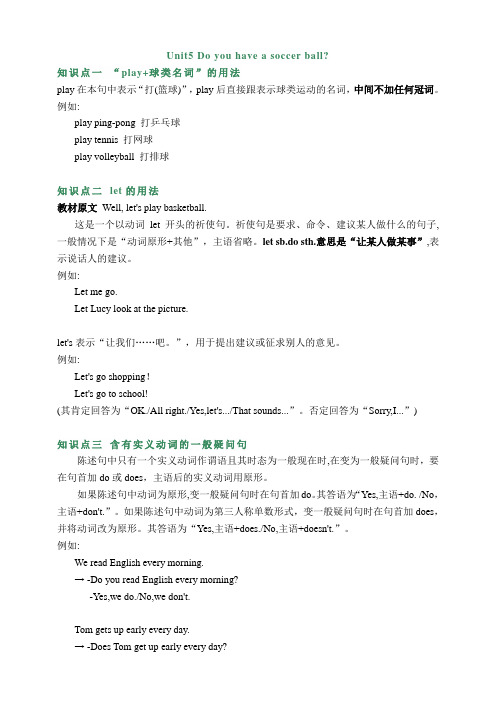
Unit5 Do you have a soccer ball?知识点一“play+球类名词”的用法play在本句中表示“打(篮球)”,play后直接跟表示球类运动的名词,中间不加任何冠词。
例如:play ping-pong 打乒乓球play tennis 打网球play volleyball 打排球知识点二let的用法教材原文Well, let's play basketball.这是一个以动词let开头的祈使句。
祈使句是要求、命令、建议某人做什么的句子,一般情况下是“动词原形+其他”,主语省略。
let sb.do sth.意思是“让某人做某事”,表示说话人的建议。
例如:Let me go.Let Lucy look at the picture.let's表示“让我们……吧。
”,用于提出建议或征求别人的意见。
例如:Let's go shopping!Let's go to school!(其肯定回答为“OK./All right./Yes,let's.../That sounds...”。
否定回答为“Sorry,I...”)知识点三含有实义动词的一般疑问句陈述句中只有一个实义动词作谓语且其时态为一般现在时,在变为一般疑问句时,要在句首加do或does,主语后的实义动词用原形。
如果陈述句中动词为原形,变一般疑问句时在句首加do。
其答语为“Yes,主语+do. /No,主语+don't.”。
如果陈述句中动词为第三人称单数形式,变一般疑问句时在句首加does,并将动词改为原形。
其答语为“Yes,主语+does./No,主语+doesn't.”。
例如:We read English every morning.→ -Do you read English every morning?-Yes,we do./No,we don't.Tom gets up early every day.→ -Does Tom get up early every day?-Yes,he does./No,he doesn't.三、巩固练习1.I have ______ soccer ball. But I can't play ______ soccer.A. a;theB. the;theC. the;/D. a;/2.Tony plays ______ every day.A.basketballsB.basketballC.a basketballD.the basketball3. -Let's ______ volleyball.-That ______ good.A.playing;isB.play;soundsC.play;is soundD.to play;sounds4.-Let's play computer games.- ______ .A.Well, let's play soccerB.No, I don'tC.That sounds goodD.No, I don't have a ball5.My father doesn't play sports. He only ______ on TV.A.watches itB.watch themC.watch itD.watches them6.My brother likes ______ volleyball.A.playsB.playing theC.playingD.play答案DBBCDC。
最新人教七年级英语 Unit 5 Do you have a soccer ball 重点知识讲解

1. Well, let’s play basketball.★句中let’s是let us的缩写形式,let’s后跟动词原形。
句型Let’s ...常用来提出建议,意为“让我们……吧”。
肯定答语可用OK. / Great. / That sounds good.等;否定答语可用Sorry, I ...等。
如:—Let’s go shopping (去购物).—That sounds good. / Sorry, I can’t.★ let 还可用于let sb. do sth.结构,意为“让某人做某事”。
sb. 可为名词或人称代词的宾格形式。
如:Let Jane talk. Let me ask him.★句中play basketball意为“打篮球”。
play后接表示球类的名词时,该名词前不需要加任何冠词,如play soccer, play ping-pong等。
【运用】根据汉语意思完成英语句子,每空一词(含缩略形式)。
(1) 让我们在图书馆见吧。
________ ________ in the library.(2) 让他们去拿那些书吧。
________ ________ get those books.(3) 弗兰克喜欢在下午打棒球。
Frank likes to ________ ________ in the afternoon.2. I like ping-pong. It’s easy for me.★该句意为“我喜欢乒乓球运动,它对我来说挺容易的”。
★句中的It指代前面的ping-pong。
句型“sth. + be +形容词+ for sb.”表示“……对于某人来说是……的”。
sb.可为名词或人称代词的宾格形式。
如:Math (数学) is easy for Alan / him.【运用】根据汉语意思完成英语句子,每空一词(含缩略形式)。
(1) 英语对她来说不难。
English ________ difficult for ________.(2) 约翰喜欢网球运动,它对约翰来说很容易。
- 1、下载文档前请自行甄别文档内容的完整性,平台不提供额外的编辑、内容补充、找答案等附加服务。
- 2、"仅部分预览"的文档,不可在线预览部分如存在完整性等问题,可反馈申请退款(可完整预览的文档不适用该条件!)。
- 3、如文档侵犯您的权益,请联系客服反馈,我们会尽快为您处理(人工客服工作时间:9:00-18:30)。
Unit 5 Note:一. Let’s play tennis. 让我们打网球吧!1. Let’s ... 意为“让我们…吧!”,用来提出建议,后接动词原形,其中let’s是 let us的缩写。
如: Let’s ______ volleyball. 让我们打排球吧!当别人提议做某事时,如果表示同意,我们可以说“All right.”(好吧。
)“OK.”(好的。
)“That sounds good./interesting…”“Good idea.”或者用“Great.”(太棒了。
)表示不赞同时,可以直接说:“sorry.”如:Let’s play soccer.---Good idea./ Sorry, I’m busy now.2. let sb. do sth. 让某人做某事(sb.代表人,如果是代词用宾格,do代表动词原形)Let ____(我) ____(帮助)you. Let ____ (他)____.(走)二.late1、形容词时,“迟的,晚的”Yon are late again,don’t be late next time.你又迟到了,下次别这样。
2. be late for……迟到He ___ ____ _____ school. 他上学迟到了。
三.get1. 得到、收到”如:get a letter 收到一封信。
I have got a pen.2.get+sb.+sth.= get sth. For sb.为某人弄到/ 拿到事物Could you please get me some nice cards?四.play v. 玩;打(球)Do you play volleyball? 你打排球吗?I can play the piano. 我会弹钢琴。
1. play和球类运动的名称连用时, 球类运动的名称前不用冠词。
2. play和乐器名称连用时, 乐器名称前一般要用定冠词the。
3. 玩耍,玩play computer games 玩电脑游戏play sports 参加体育运动或比赛在需要的地方填写定冠词1. —Let’s play _____ basketball. —That sounds good.2. I can play ____ violin (小提琴).3. She plays _____ sports every day.五. That sounds interesting. 那听起来很有趣。
1. sound意为“听起来”时, 是系动词, 后面常接形容词。
2. 此外sound后还可接名词短语。
That sounds a good idea. 那听起来是个好主意。
3. 拓展: sound还可用作名词, 意为“声音;响声”, 泛指自然界中所能听到的任何声音。
用所给词的适当形式填空。
1. —Let’s watch TV. —That ______ (sound) great!2. —I have a great sports collection. —That sounds _________ (interest).3. Listen! Strange (奇怪的) _______ (sound) are from the classroom.六.interesting interest+ ing1. adj. 作形容词,意为“有趣的;令人感兴趣的”,在句中可作定语(放在名词前)或表语(放在系动词be / sound等后)。
如:This is an interesting storybook. This storybook is very interesting.interested作表语,interest+ed强调“某人对……感兴趣”。
例题This book is very , I am very in it.A. interesting; interestedB. interested; interestingC. interesting; interestingD. interested; interested2. relaxing adj.:relax+ing令人轻松的/放松的(用于形容事、物)The music is relaxing.relaxed adj. relax+ed(用于形容人). 感到轻松的/放松的She is very relaxed。
她感到很轻松。
例题We are Xinbin park.A. relaxingB. relaxedC. relaxD. to relax3. boring( bore+ing)与bored(bore+ed)的用法:当形容人时用bored指使人感到厌烦的,boring是指事情或人本身无趣的.He is so boring.(他真没趣) I am bored!(我感到很无聊)七.fun 1. 有趣的,令人有愉快的He is fun. She is a fun girl.2. 不可数名词,有趣的人或事物可说much/ a lot of/ great funhave fun 玩得愉快,后也可加名词或动词have fun doing sth We have fun playing soccer.八.difficult 困难的,= hard1.做定语:a difficult question一个很难的问题。
2.作表语:This question is difficult.(注:普通形容词都可以如上用。
)3. 句型:it is difficult for sb. to do sth. 做某事对某人来说很难。
如:it is difficult for me to answer the question.九.go 去单三形式goes1. go与to一起构成动词短语,后接地点名词,表示“去……”。
如:go to the playground去操场go to school去上学go____ ____park去公园go____ Beijing去北京2. go后接表示地点的副词,表示“去……”,不用to。
如:go there去那儿go home回家3. go后接动词的-ing形式,表示“去做……”。
如:go shopping去购物go swimming去游泳go fishing去钓鱼go hiking去徒步旅行十.the same 表示“同一个”,“一样”:We are in the same school.十一. vt. like, love 1.like doing/to do,love doing/to do 两者都可以,表示喜欢做某事。
love表示的“程度”要深一些。
例:1.What do you like/love to do ? 2.Does he like playing games?I ______ ________ these books very much. 我很喜欢读这些书。
Tom _____ ______ ________ to school. 汤姆不喜欢上学。
十二. with 1. .“同…一起/一同” ;和…;Mary plays tennis with me. = Mary and I play tennis.My brother______ to school with me. = My brother and I _____ to school.2. .“用…方法/工具”Tom writes with a pen.十三. sport n. 运动,My favorite sport is (playing)soccer.1. 作定语,常用复数sports ______ shoes运动鞋 a _______ jacket运动夹克例题Let’s .A. play sportB. to play sportsC. play sportsD. plays sports2. play sports/ do sports 做运动,锻炼十四. watch 单三________ watch1. 作动词,意为“观看;注视”。
作名词,意为“手表”。
如: Do you have a watch?2. watch/ look/ see/ read(1)look为不及物动词,指看的过程,表示有意识地集中精力去看,但并不一定能看见,多用来唤起别人的注意。
其后接宾语时,一定要加介词at。
如:Look!Who is swimming in the river?瞧!谁在河里游泳?Please look at the blackboard.请看黑板。
(2)see用作及物动词,后接宾语,意为“看见”、“看到”,主要强调看的结果,但不一定是有意识地看。
“看医生”、“看电影”常用这个词。
如:I am looking at the blackboard,but I can't see the words.我在看黑板,但看不见上面的字。
You must take your baby to see a doctor.你必须带你的孩子去看医生。
We are going to see a film this afternoon.今天下午我们打算去看电影。
watch为及物动词,意为“观看”、“注视”,指非常仔细地、有目的、全神贯注地“看”。
“看电视”、“看比赛(实验以及各种表演等)”习惯上用这个词。
如:看电视watch TV,看球赛watch a match。
They are watching a football game.他们正在看足球比赛。
Kate often _______ TV on Sunday.凯特常常在星期天看电视。
read本义为“读”、“朗读”。
表达“看书”、“看报”、“看信”、“看杂志”时,通常用read。
如:如看书read a book,看报纸read a newspaper,看杂志read a magazineDon't read in the sun.不要在阳光下看书。
例题I outside but 1 can’t anything.A. look; watchB. look; lookC. look; seeD. watch; seeLook at my , It’s time to the football match.A. watch; watchB. watch; lookC. watch; seeD. watches; watching十五. I only watch them on TV. 我只是在电视上看它们。
1. only 作副词,意为“只;仅仅”。
